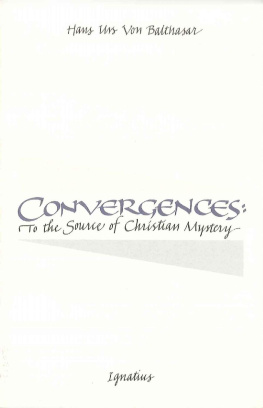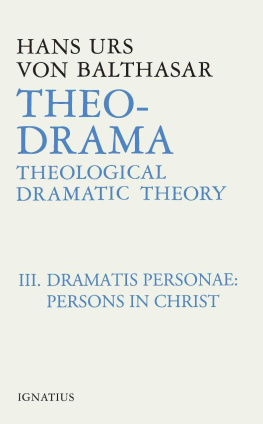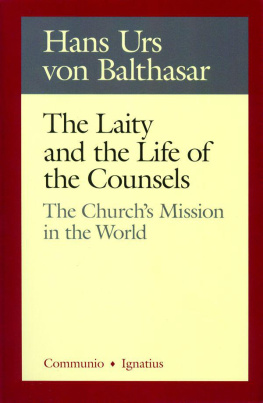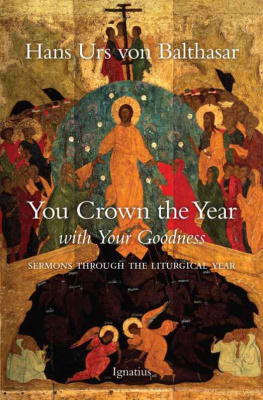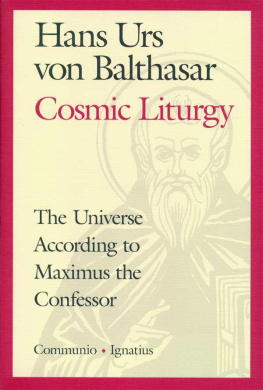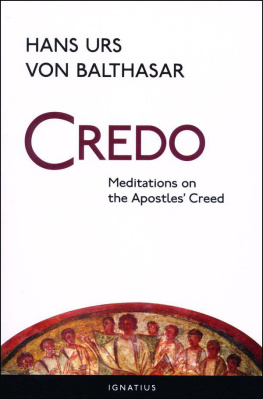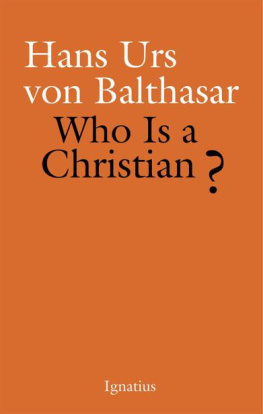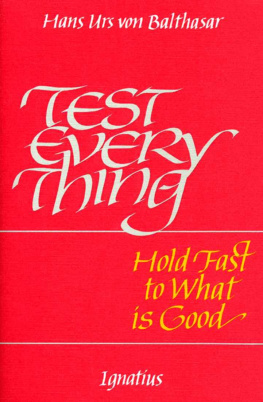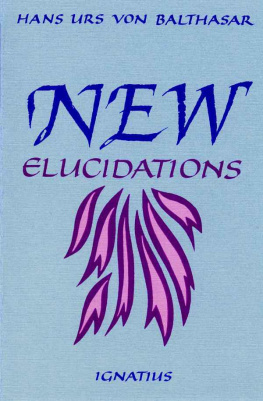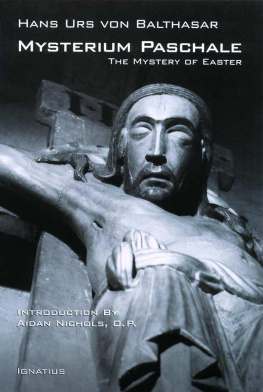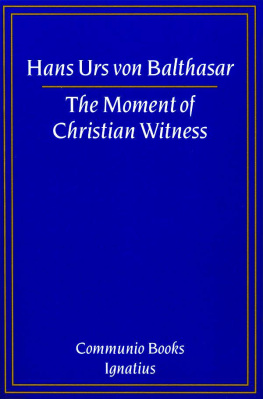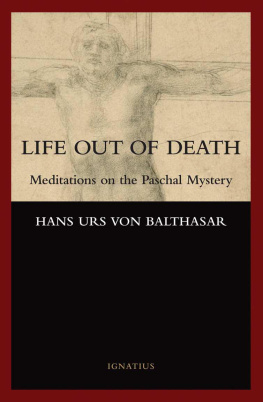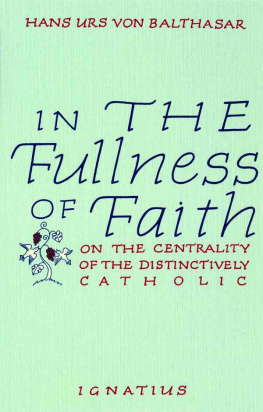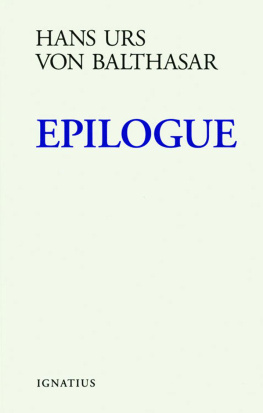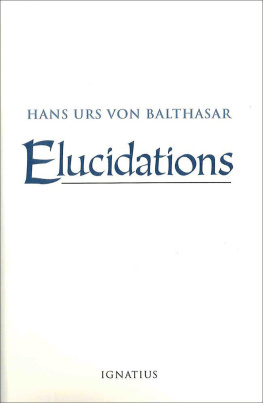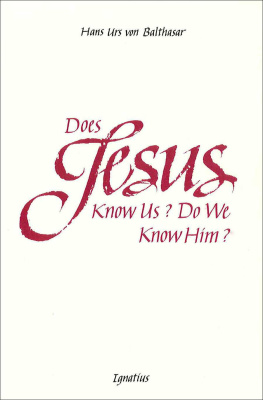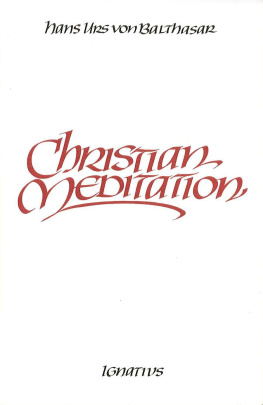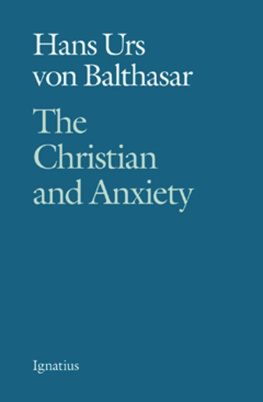Hans Urs von Balthasar - Convergences: To the Source of Christian Mystery
Here you can read online Hans Urs von Balthasar - Convergences: To the Source of Christian Mystery full text of the book (entire story) in english for free. Download pdf and epub, get meaning, cover and reviews about this ebook. year: 1983, publisher: Ignatius Press, genre: Religion. Description of the work, (preface) as well as reviews are available. Best literature library LitArk.com created for fans of good reading and offers a wide selection of genres:
Romance novel
Science fiction
Adventure
Detective
Science
History
Home and family
Prose
Art
Politics
Computer
Non-fiction
Religion
Business
Children
Humor
Choose a favorite category and find really read worthwhile books. Enjoy immersion in the world of imagination, feel the emotions of the characters or learn something new for yourself, make an fascinating discovery.
- Book:Convergences: To the Source of Christian Mystery
- Author:
- Publisher:Ignatius Press
- Genre:
- Year:1983
- Rating:3 / 5
- Favourites:Add to favourites
- Your mark:
- 60
- 1
- 2
- 3
- 4
- 5
Convergences: To the Source of Christian Mystery: summary, description and annotation
We offer to read an annotation, description, summary or preface (depends on what the author of the book "Convergences: To the Source of Christian Mystery" wrote himself). If you haven't found the necessary information about the book — write in the comments, we will try to find it.
Hans Urs von Balthasar: author's other books
Who wrote Convergences: To the Source of Christian Mystery? Find out the surname, the name of the author of the book and a list of all author's works by series.
Convergences: To the Source of Christian Mystery — read online for free the complete book (whole text) full work
Below is the text of the book, divided by pages. System saving the place of the last page read, allows you to conveniently read the book "Convergences: To the Source of Christian Mystery" online for free, without having to search again every time where you left off. Put a bookmark, and you can go to the page where you finished reading at any time.
Font size:
Interval:
Bookmark:
CONVERGENCES
To the Source of Christian Mystery
HANS URS VON BALTHASAR
To the Source of Christian Mystery
TRANSLATED BY E. A. NELSON
IGNATIUS PRESS SAN FRANCISCO
Title of German original:
Einfaltungen: auf Wegen christlicher Einigung
1969 by Ksel Verlag GmbH and Co., Munich
Cover by Victoria Hoke
1983 Ignatius Press, San Francisco
All rights reserved
ISBN: 978-0-89870-032-9 (PB)
ISBN: 978-1-68149-111-0 (E)
Library of Congress Catalogue Number 83-081853
Printed in the United States of America
1. The Scientific Structure of Theology
2. The Three Faces of Theology
3. The Sciences of Theology
1. Introduction
2. The Unity of the Old Testament Theologies
3. The Transcendence of Jesus Christ
4. The Unity of the New Testament Theologies
5. The Unity of Theologies in the Church
The works here assembled were first published in the following publications. In order to leave the texts unchanged, minor repetitions have not been corrected.
The Unity of Theology and Spirituality: Gregorianum , Fall 1969.
The Unity of Theological Sciences: Hochland 60 (Dec. 1968), 693-703.
The Multiplicity of Biblical Theologies and the Spirit of Unity in the Church: Freiburger Zeitschrift fr Philosophic und Theologie 15 (1968), 171-89.
The Unity of Our Lives: Schweizer Rundschau (Dec. 1968), 642-49.
Only If: previously unpublished.
The German title of this book, Einfaltungen , is an example of Hans Urs von Balthasars creativity and the flexibility of the German language. Father von Balthasar uses this word and the verb einfalten to indicate a movement of recentralization and convergence, a return of multiplicity into the unity that is its sourcein-folding as the reverse of unfolding. There is also a relationship to the words Einfalt and einfltig , describing the simplicity of simpletons or childrenthe little ones to whom the mysteries of Gods kingdom are revealed according to a Gospel passage quoted several times in these pages. Einfaltung and einfalten have been translated with various forms and combinations of to simplify, to integrate and to converge.
I want to thank Dr. Erasmo Leiva-Merikakis, who suggested the English title for the book and answered many questions about translation. And I owe a special debt of gratitude to Mr. Michael Waldstein, who edited the first draft of this translation and made it significantly more accurate and lucid. Vergelts Euch Gott .
...
Up until the baroque era, Christian thought basked in the inexhaustible capacity of biblical revelation to be unfolded; the more branches, twigs, and leaves could be developed from the old stem, the more alive its root seemed to show itself. The last century, that of Darwin, spoke readily and in high spirits of the evolution of dogma, and meant by this an expansion of the treasure of wisdom and knowledge (Col 2:3) hidden in Christan expansion which is legitimate and even demanded by the subject. But the extensive clement almost always weakens intensity; besides, the orientation towards the Many runs contrary to the direction which all the religious thought and endeavor of humanity has taken from the very beginning: out of multiplicity to the One, to the one thing necessary. Qui trop embrasse, mal treint , says an energetic proverb.
Today we are on the way backso much so that in many places it looks like confused flight. To save the foundering ship, things are thrown overboard blindly and at random. It is thought that liberating unity is achieved by ridding oneself of superfluous amassed goods. Not only churches are emptied out until they stand there naked and bareO trees of life, when winter-like?but so too are dogmatics. And as a matter of fact, not only worm-eaten baroque altars stand ready to be torn down, but also decayed theologies, which can be roused to life scarcely or not at allunless one were to possess the magic wand of an Henri de Lubac or a Karl Rainier, men who know how to awaken unhoped-for timely living substance from what seemed to be dead. The one who can do such things, however, must possess a valid criterion for the discernment of spirits: What may and should be given up, and what on the other hand needs only a creative transformation in order to show itself helpful and indispensable? Such discerning requires a knowledge and experience of the unity from which all multiplicity went forth, and into which it must again let itself be integrated if it truly was an explication of the One. Unity always remains judge over its own fullness: what cannot be led back into it without force becomes a wall instead of a window.
Today we must investigate in what way the Christian wealth, without lossessuch as a vanquished army leaves behind on the battlefieldrelates to its origin: to the ineffable poverty of the divine, incarnate, crucified love. We draw close together, near to the sources and beginnings, in order to hear exactly the Word that was in the beginning. We unite ourselves outwardly; the question is whether the grace will be given us to collect ourselves inwardly as well.
This will not work without earnest effort of thought. Dogmas which we now know only from the outside, as the content of the faith, and which have mostly been presented to us as such in catechism and from the pulpit, we must try to see from within again: as the manifestation of the one, single, indivisible truth of God. Supposing that this truth has presented itself to us as the eternal love which surprises us and lays its claims on us temporal creatures: Will not the basic articulations of the so-called Christian doctrineTrinity, Incarnation, Cross and Resurrection, Church and Eucharistbecome the immediate radiations of the glowing core of this truth? How should God, the One and Absolute, be eternal love, if he were not triune? And how, if he did not prove this being love to the end in the Cross and Eucharist for the world, which he created out of love, and if he did not take the world up, in Church and Resurrection, into the eternally moved rest of the exchange of love? Dogmas must be nothing other than aspects of the love which manifests itself and yet remains mystery within revelation; if they are no longer this, then gnosis has triumphed over love, human reason has conquered God, and at this instantfirst in theology, then in the Church, then in the worldGod is dead.
We integrate: not out of resignation, but to regain the origin. We are stranded on the sandbanks of rationalism; we feel our way back to the sheer rock of the Mysterium . The rationalist can no longer pray, only rationalize, and in the end only criticize. But he who can no longer pray is incapable even of beginning a dialogue with one of the worlds religions, let alone of showing in this discussion that more truth, because more absolute love, is present in the Christian religion.
Today the Christian people (or what is left of it) is searching with a lamp for persons who radiate something of the light, something of nearness to the source. It has long since had enough of the modernities, lacking all religious instinct, which trumpet at it from the press, the radio, and often enough from the pulpit. It is sad because it is untended, and an all too justified fear torments it that the one thing necessary could be totally blocked off and made inaccessible by the experts, or the many dilettantes and apostates who pose as such. Often these are poor wretches, who must shout so loud in order to justify to themselves their inner predicament of no longer being able to pray. And the people has a sharp ear for spiritual sour notes.
We integrate, returning to the center. First we will show that between Christian thought and life (theology and spirituality) there exists such a unity that each of them can have a proper truth only through the other and together with it. We will then show how within theology, which seems to dissolve into many and ever more numerous disciplines, the unity of dogma governs and directs all specializations. Then we will consider the dreadful multiplicity of churches and its pseudo-justification through the alleged variety of theologies already in the New Testament; and we will seek the path, the frequently covered and overgrown path, which opens ways back for the lost ones, the ones who have drawn apart from each other, who have clambered out into the branches. Finally, each person must think briefly about himself, and ask himself where the point vierge , the integrated simplicity of his own existence might lie.
Next pageFont size:
Interval:
Bookmark:
Similar books «Convergences: To the Source of Christian Mystery»
Look at similar books to Convergences: To the Source of Christian Mystery. We have selected literature similar in name and meaning in the hope of providing readers with more options to find new, interesting, not yet read works.
Discussion, reviews of the book Convergences: To the Source of Christian Mystery and just readers' own opinions. Leave your comments, write what you think about the work, its meaning or the main characters. Specify what exactly you liked and what you didn't like, and why you think so.

